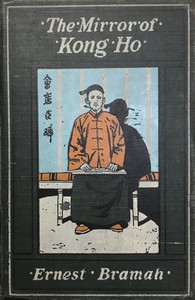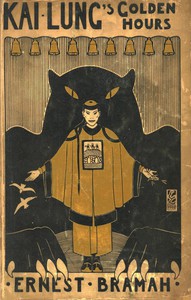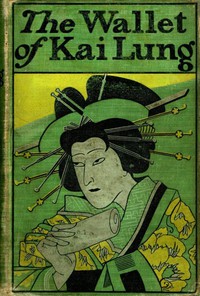The Mirror of Kong Ho by Ernest Bramah (big screen ebook reader .TXT) 📗

- Author: Ernest Bramah
Book online «The Mirror of Kong Ho by Ernest Bramah (big screen ebook reader .TXT) 📗». Author Ernest Bramah
Venerated Sire,—It is now more than three thousand years ago that the sublime moralist Tcheng How, on being condemned by a resentful official to a lengthy imprisonment in a very inadequate oil jar, imperturbably replied, “As the snail fits his impliant shell, so can the wise adapt themselves to any necessity,” and at once coiled himself up in the restricted space with unsuspected agility. In times of adversity this incomparable reply has often shone as a steadfast lantern before my feet, but recently it struck my senses with a heavier force, for upon presenting myself on the last occasion at the place of exchange frequented by those who hitherto have carried out your spoken promise with obliging exactitude, and at certain stated intervals freely granted to this person a sufficiency of pieces of gold, merely requiring in return an inscribed and signet-bearing record of the fact, I was received with no diminution of sympathetic urbanity, indeed, but with hands quite devoid of outstretched fulness.
In a small inner chamber, to which I was led upon uttering courteous protests, one of solitary authority explained how the deficiency had arisen, but owing to the skill with which he entwined the most intricate terms in unbroken fluency, the only impression left upon my superficial mind was, that the person before me was imputing the scheme for my despoilment less to any mercenary instinct on the part of his confederates, than to a want of timely precision maintained by one who seemed to bear an agreeable-sounding name somewhat similar to your own, and who, from the difficulty of reaching his immediate ear, might be regarded as dwelling in a distant land. Encouraged by this conciliatory profession (and seeing no likelihood of gaining my end otherwise), I thereupon declared my willingness that the difference lying between us should be submitted to the pronouncement of dispassionate omens, either passing birds, flat and round sticks, the seeds of two oranges, wood and fire, water poured out upon the ground or any equally reliable sign as he himself might decide. However, in spite of his honourable assurances, he was doubtless more deeply implicated in the adventure than he would admit, for at this scrupulous proposal the benignant mask of his expression receded abruptly, and, striking a hidden bell, he waved his hands and stood up to signify that further justice was denied me.
In this manner a state of destitution calling for the fullest acceptance of Tcheng How’s impassive philosophy was created, nor had many hours faded before the first insidious temptation to depart from his uncompromising acquiescence presented itself.
At that time there was no one in whom I reposed a larger-sized piece of confidence (in no way involving sums of money,) than one officially styled William Beveledge Greyson, although, profiting by our own custom, it is unusual for those really intimate with his society to address him fully, unless the occasion should be one of marked ceremony. Forming a resolution, I now approached this obliging person, and revealing to him the cause of the emergency, I prayed that he would advise me, as one abandoned on a strange Island, by what handicraft or exercise of skill I might the readiest secure for the time a frugal competence.
“Why, look here, aged man,” at once replied the lavish William Greyson, “don’t worry yourself about that. I can easily let you have a few pounds to tide you over. You will probably hear from the bank in the course of a few days or weeks, and it’s hardly worth while doing anything eccentric in the meantime.”
At this delicately-worded proposal I was about to shake hands with myself in agreement, when the memory of Tcheng How’s resolute submission again possessed me, and seeing that this would be an unworthy betrayal of destiny I turned aside the action, and replying evasively that the world was too small to hold himself and another equally magnanimous, I again sought his advice.
“Now what silly upside-down idea is it that you’ve got into that Chinese puzzle you call your head, Kong?” he replied; for this same William was one who habitually gilded unpalatable truths into the semblance of a flattering jest. “Whenever you turn off what you are saying into a willow-pattern compliment and bow seventeen times like an animated mandarin, I know that you are keeping something back. Be a man and a brother, and out with it,” and he struck me heavily upon the left shoulder, which among the barbarians is a proof of cordiality to be esteemed much above the mere wagging of each other’s hands.
“In the matter of guidance,” I replied, “this person is ready to sit unreservedly on your well-polished feet. But touching the borrowing of money, obligations to restore with an added sum after a certain period, initial-bearing papers of doubtful import, and the like, I have read too deeply the pointed records of your own printed sheets not to prefer an existence devoted to the scraping together of dust at the street corners, rather than a momentary affluence which in the end would betray me into the tiger-like voracity of a native money-lender.”
“Well, you do me proud, Kong,” said William Beveledge, after regarding me fixedly for a moment. “If I didn’t remember that you are a flat-faced, slant-eyed, top-side-under, pig-tailed old heathen, I should be really annoyed at your unwarrantable personalities. Do you take ME for what you call a ‘native money-lender’?”
“The pronouncements of destiny are written in iron,” I replied inoffensively, “and it is as truly said that one fated to end his life in a cave cannot live for ever on the top of a pagoda. Undoubtedly as one born and residing here you are native, and as inexorably it succeeds that if you lend me pieces of gold you become a money-lender. Therefore, though honourably inspired at the first, you would equally be drawn into the entanglement of circumstance, and the unevadible end must inevitably be that against which your printed papers consistently warn one.”
“And what is that?” asked Beveledge Greyson, still regarding me closely, as though I were a creature of another part.
“At first,” I replied, “there would be an alluring snare of graceful words, tea, and the consuming of paper-rolled herbs, and the matter would be lightly spoken of as capable of an easy adjustment; which, indeed, it cannot be denied, is how the detail stands at present. The next position would be that this person, finding himself unable to gather together the equivalent of return within the stated time, would greet you with a very supple neck and pray for a further extension, which would be permitted on the understanding that in the event of failure his garments and personal charms should be held in bondage. To escape so humiliating a necessity, as the time drew near I would address myself to another, one calling himself William, perchance, and dwelling in a northern province, to whom I would be compelled to assign my peach-orchard at Yuen-ping. Then by varying degrees of infamy I would in turn be driven to visit a certain Bevel of the Middle Lands, a person Edge carrying on his insatiable traffic on the southern coast, one Grey elsewhere, and a Mr. Son, of the west, who might make an honourable profession of lending money without any security whatever, but who in the end would possess himself of my ancestral tablets, wives, and inlaid coffin, and probably also obtain a lien upon my services and prosperity in the Upper Air. Then, when I had parted from all comfort in this life, and every hope of affluence in the Beyond, it would presently be disclosed that all these were in reality as one person who had unceasingly plotted to my destruction, and William Beveledge Greyson would stand revealed in the guise of a malevolent vampire. Truly that development has at this moment an appearance of unreality, and worthy even of pooh-pooh, but thus is the warning spread by your own printed papers and the records of your Halls of Justice, and it would be an unseemly presumption for one of my immature experience to ignore the outstretched and warning finger of authority.”
“Well, Kong,” he said at length, after considering my words attentively, “I always thought that your mental outlook was a hash of Black Art, paper lanterns, blank verse, twilight, and delirium tremens, but hang me if you aren’t sound on finance, and I only wish that you’d get some of my friends to look at the matter of borrowing in your own reasonable, broad-minded light. The question is, what next?”
I replied that I leaned heavily against his sagacious insight, adding, however, that even among a nation of barbarians one who could repeat the three hundred and eleven poems comprising the Book of Odes from beginning to end, and claim the degree “Assured Genius” would ever be certain of a place.
“Yes,” replied William Greyson,—“in the workhouse. Put your degree in your inside pocket, Kong, and don’t mention it. You’ll have far more chance as a distressed mariner. The casual wards are full of B.A.‘s, but the navy can’t get enough A.B.‘s at any price. What do you say to an organ, by the way? Mysterious musicians generally go down well, and I dare say there’s room for a change from veiled ladies, persecuted captains and indigent earls. You ought to make a sensation.”
“Is it in the nature of melodious sounds upon winding a handle?” I asked, not at the moment grasping with certainty to what organ he referred.
“Well, some call them that,” he admitted, “others don’t. I suppose, now, you wouldn’t care to walk to Brighton with your feet tied together, or your hair in curl papers, and then get on at a music hall? Or would there be any chance of your Legation kidnapping you if it was properly worked? ‘Kong Ho, the great Chinese Reformer, tells the Story of his Life,’—there ought to be money in it. Are you a reformer or the leader of a secret society, Kong?”
“On the contrary,” I replied, “we of our Line have ever been unflinching in our loyalty to the dynasty of Tsing.”
“You ought to have known better, then. It’s a poor business being that in your country nowadays. Pity there are no bye-elections on the African Labour Question, or you’d be snapped up for a procession.”
To this I replied that although the idea of moving in a processional triumph would readily ensnare the minds of the light and fantastic, I should prefer some more literary occupation, submissively adding that in such a case I would not stiffen my joints against the most menial lot, even that of blending my voice in a laudatory chorus, or of carrying official pronouncements about the walls of the city, for it is said with justice, “The starving man does not peel his melon, nor do the parched first wipe round the edges of the proffered cup.”
“If you’ve set your mind on something literary,” said Beveledge confidently, “you have every chance of finishing up in a chorus or carrying printed placards about the streets, certainly. When it comes to that, look me up in Eastcheap.” With this encouraging assurance of my ultimate success he left me, and rejoicing that I had not fallen into the snare of opposing a written destiny, I sought the literary quarters of the city.
When this person has been able to write of any custom or facet of existence here in a strain of conscientious esteem, he has not hesitated to dip his brush deeply into the inkpot. Reverting backwards, this barbarian enactment of not permitting those who from any cause have decided upon spending the night in a philosophical abstraction to repose upon the public seats about the swards and open spaces is not conceived in a mood of affable toleration. Nevertheless there are deserted places beyond the furthest limits of the city where a more amiable full-face is shown. On the eleventh day of this one’s determination to sustain himself by the exercise of his literary style, he was journeying about sunset towards one of these spots, subduing the grosser instincts of mankind by reviewing the wisdom of the sublime Lao Ch’un, who decided that heat and cold, pain and fatigue, and mental distress, have no real existence, and are therefore amenable to logical disproof, while the cravings of hunger and thirst are merely the superfluous attributes of a former and lower state of existence, when a passer-by, who for some distance had been alternately advancing before and remaining behind, matched his footsteps into mine.
“Whichee way walk-go, John, eh?” said this unfortunate being, who appeared to be suffering from a laborious deformity of speech. “Allee samee load me. Chin-chin.”
Filled with compassion for one who evidently found himself





Comments (0)